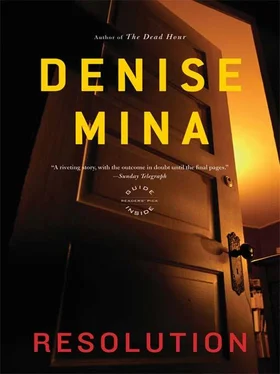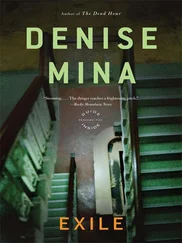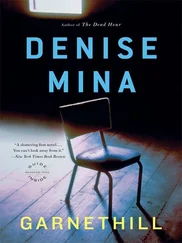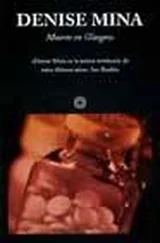She covered her face, feeling like a histrionic arsehole, wishing she could control herself, but her nose was dripping onto her lip and she couldn't catch her breath. She didn't want to cry, especially not in front of Alex, and in the effort to suppress it she let go a high-pitched, piggy squeal. Across the lane the tap-dancing children clattered their way to an untidy climax. The group was waiting for Maureen to wrap up but she couldn't speak. She put a hand to her head and dug her nails into her scalp, dragging them back on her head, and the clear, searing pain drew the breath back into her body. She sat up and managed a wobbly smile. "So, I'm trying to enjoy these last few days. Trying to savor things. Enjoy things." She licked a hot tear from her lip. "Any advice would be welcome."
She sat back, drawing tremulously on her cigarette, and the group looked away from her. It was like the reaction Colin got every week. There was no solution to the problem, there was nothing to say. They'd pat her shoulder on the way out. A couple of them would hug her awkwardly. Liz the Christian would promise to pray for her, and they'd all go home. Sheila asked for another speaker and Alice came in to talk about her insomnia. She was wearing a long-sleeved top despite the hot weather, pulling the cuffs down over her hands as she spoke, and they all guessed that she had been cutting herself again. She didn't mention it.
Sheila chaired through another three speakers, but Maureen wasn't listening. She hadn't meant to say any of that. She finished her fag and stubbed it out in a filthy tin ashtray, swirling the compressed ash from a hundred dead cigarettes, releasing the sick, thick smell of stale smoke. Enjoy the days, she told herself, just enjoy. It didn't matter that she'd made an arse of herself. She wished Hugh were here, that he could talk to her afterwards and make it all right.
When the meeting was finished they stood downstairs, chatting and smoking and making arrangements for the following week. Sheila threw the cups into the bin, made sure the urn was off and wiped down the worktop and sink. "Okay, everybody," she said, clapping her hands, "let's go."
They shuffled out to the lane. In the new hall the dancing class was finishing too. The fire exit had been left open to let the air in. Past the blur of yellow light came the noise of children screaming and chasing one another. Sheila stopped Maureen. "Let me give you a lift home," she said quietly.
"Naw," said Maureen, still embarrassed, "I'm fine, I'll walk."
"I'll drive you home," said Sheila, and turned to lock the door.
The others called good-bye and made their way out to the street, saying final good-byes as they reached the pavement before dispersing into the bright evening. Most of the group were friends and phoned one another during the week for support. Maureen had managed to attend for two months without making a single firm friend. She liked it that way, liked keeping it separate from the rest of her life.
"Look, it's all right," she said, "I'd really like to walk."
"No," said Sheila, holding up her hand to avert further protest, "I'll drive you."
Maureen actually did want to walk. Her house was two pleasant miles away and she liked walking in the fading light, when she could think and talk to herself without feeling self-conscious. Maybe Sheila needed to talk. Maureen climbed into the estate car and Sheila turned to her. "Have you got time for a cup of tea?" she asked.
Maureen didn't really want to go with her. Sheila was very nice but she was hard to listen to. She had a tendency to talk like a vague, new-age self-help book that Maureen couldn't quite understand. " Kay." She shrugged, hoping it wouldn't take long.
Sheila started the car and drove up the hill, through the posher areas of Hyndland and over to the high flats at Broomhill.
Michael had disappeared when Maureen was ten. She had no memory of him leaving the family home, just of him being there and then not being there, that before was the darkness and after was the light. He had locked Maureen in the cupboard under the stairs when he left but she didn't remember that either. Una and Marie did: they were there when their mother, Winnie, crowbarred the door open and pulled Maureen out. They remembered the blood between her legs and her limp, blank compliance as they all gave her a bath to wash it away. Winnie said she'd fallen on her bottom. They knew instinctively not to talk about it or mention it outside the family. Maureen grew up into a strange young woman.
Crippling fears haunted her at school and university. Bizarre stimuli could floor her for days: a figure in a door with the light behind him, the sound of a man breathing through a blocked nose, the smell of gin and orange on someone's breath, certain types of brown shoes or hair cut razor-straight along the neckline. She had bad dreams that stayed with her for days. She often found it hard to eat and swallow. Winnie's livid alcoholism and the graphic fights with her new husband, George, didn't exactly create a healing atmosphere in the house.
As Maureen approached the end of her degree things began to get worse. The panic attacks grew more frequent, sometimes blurring together at their ragged edges into hour-long frenzies. She began to barricade her bedroom door at night and sleep in the corner, watching the bed. She read obsessively, tracing the same lines and paragraphs over and over. She had to have a book with her at all times. If she found herself with nothing to read she'd grab a menu, read a leaflet or a bus timetable. She knew she was going down. The prospect of a bleak future wasn't a shocking disappointment. Coming from a war-torn family she had never had very high expectations – none of the O'Donnells did. Secretly and individually they all dreamed of peace and quiet. Maureen told no one what was happening. She got the first job she saw advertised, in a theater ticket office, and bought the poky flat in Garnethill.
A year and a half after graduating she disappeared. The ticket-office manager phoned Winnie and told her that Maureen had been missing for three days. It was Liam who found her, hiding in the hall cupboard in Garnethill. It was Liam who wrapped her up in a blanket and took her to hospital, carrying her to his car, whispering that she was fine, still safe, be brave. Her forehead was damp with his tears, she remembered.
When she came to, it was summer, and she spent it with Pauline Doyle in the grounds of the Northern Psychiatric Hospital. They sat in the gardens and smoked fags, did pottery classes and gossiped about the other patients and the staff. The family came to see her, Una and her husband, Alistair, standing stiffly at the end of her bed. Her eldest sister, Marie, was too busy to visit but sent a message from London that Maureen remembered as a wish that she wasn't sick. Winnie came, drunk and drunker, attracting pitying glances from the other patients and falling out with the doctors. Liam and Leslie came to see her and be with her, reminding her of who she had been and what she might be again. She couldn't start to make sense of it until Alistair came on his own and told the doctors what Una had told him: about Michael and the bleeding.
Winnie never forgave Alistair for telling. She used to phone him when she was drunk and tell him what a shit he was. She behaved as if all the O'Donnells' troubles were caused by his loose mouth. Years later, when Una discovered Alistair was having an affair with the upstairs neighbor, Winnie took it as confirmation of everything she had ever believed about him.
What Alistair had told the doctor made sense of everything. Maureen began to piece together the dreams and flashbacks, reassembling the story, remembering and making sense of her life. Michael had left because of the blood. She remembered him seeing it, the shock on his face and the sudden anger. He must have had a ragged nail and cut her inside. She dreamed about the blood and pain, always a sharp, ripping pain in the dreams. Dr. Paton suggested a joint session with Winnie to clear up the dates and details of what had happened. During the session it became clear that Winnie didn't believe Michael had abused anyone. She started crying and ran away to the toilet with her handbag, coming back drunk and argumentative. Michael had loved Winnie. He didn't want Maureen, he wanted Winnie, he loved her. She seemed to think they'd been having an affair.
Читать дальше












